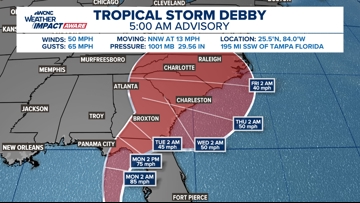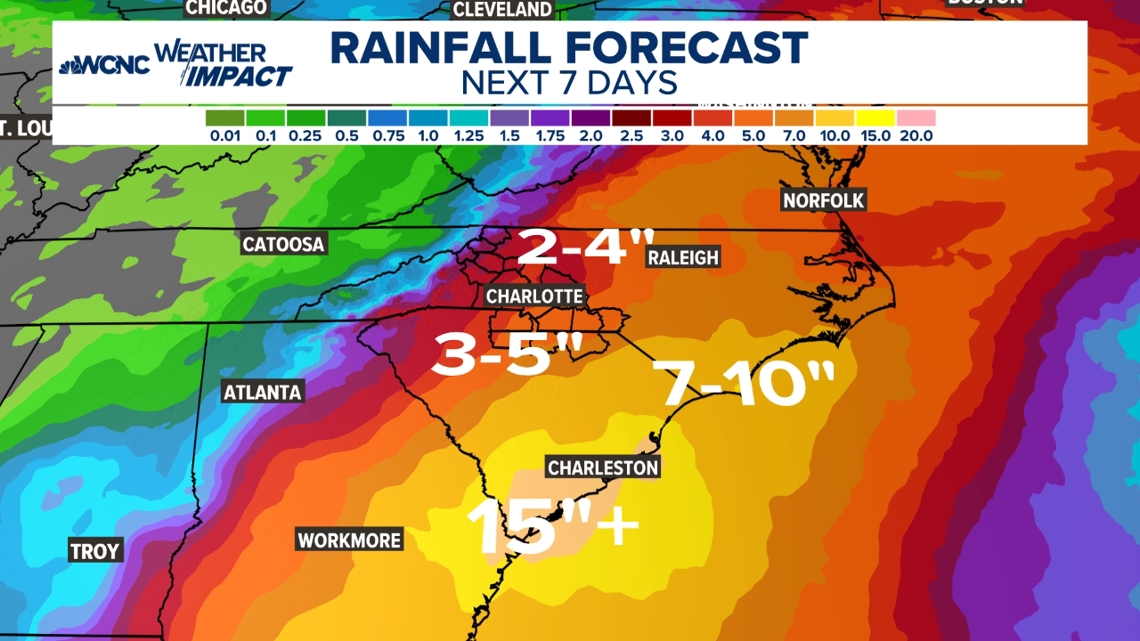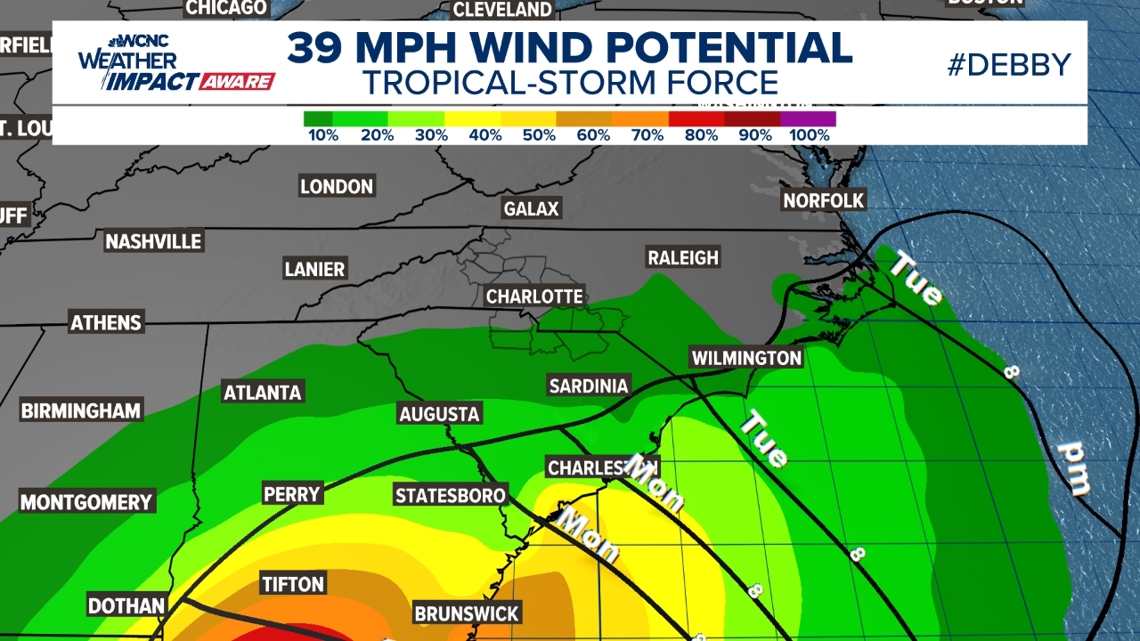- Hurricanes lose to Panthers, fall down 2-0 in Eastern Conference Finals
- NOAA forecasts 60% chance of above-average hurricane season
- CenterPoint prepares for upcoming hurricane season by simulating response
- CenterPoint Energy simulates hurricane response, pledges improvements after Beryl failures
- Is your name on the list? These are the storm names for the 2025 Atlantic Hurricane Season
How Tropical Storm Debby to impact the Carolinas

TD Four was upgraded to Tropical Storm Debby Saturday afternoon. Here’s the latest breakdown of the storm’s likely impacts to the Carolinas.
CHARLOTTE, N.C. — Florida, Georgia and the Carolinas could see impacts in the days ahead from Tropical Storm Debby. This is the fourth storm of the 2024 Atlantic hurricane season.

U.S. landfall
Tropical systems take the path of least resistance. With the positioning of a high-pressure system to the west combined with a cold front to the north, Debby is expected to make landfall in the Big Bend of Florida early Monday as a Category 1 hurricane.
Eventually, it moves across the state until it reaches the Georgia and Carolina coastlines. While the frontal boundary looks to block it from moving further inland, we’re seeing trends suggest it could cause Debby to stall out. This is due to the combination of the front blocking northward movement, high pressure to the west too far away to move Debby, and the Bermuda high to the east too weak to turn it out to sea.
As Chief Meteorologist Brad Panovich explains, it’s like being on a boat that stalls because it gets stuck behind a rock that blocks the stream’s current. If any currents (in Debby’s case: steering currents) are too weak or too far away, you go nowhere!
Carolina impacts
For the Carolinas, the highest impacts from Debby storm will be along the coast with heavy rain, dangerous beach conditions, tropical-storm-force winds and even storm surge.
This doesn’t mean inland parts of the Carolinas, including the Charlotte area, won’t see impacts. Increased cloud cover from the storm will begin as early as Monday night with the outermost rain bands moving in Tuesday afternoon.
However, it’s the expectation that Debby will stall and bring rain for multiple days that has the WCNC Charlotte Weather Impact Team keeping you weather aware. The amount of rain we see largely depends on where the storm stalls, but we need to prepare for flooding impacts mid-late week. Some rain and cloud impacts may even linger into next weekend.


Rain totals
Over the next seven days, inland communities near Charlotte will see between two and four inches of rain. Higher totals are expected along and southeast of the metro, possibly up to six inches.
The highest rainfall totals look to be along the northeastern Georgia and southern South Carolina coast, including locations like Savannah and Charleston. These areas could see over a foot of rain. From Myrtle Beach, Wilmington, to the Outer Banks, these totals will be closer to seven to ten inches.
These impacts, plus storm surge, could result in severe flooding for Carolina’s coastal communities. On top of flooding, residents can expect beach erosion, dangerous surf and boating conditions, and elevated wave heights.
Wind speeds
Wind gusts will be slightly elevated across the Charlotte area. From Wednesday through Friday, winds could gust as high as 30 mph. Most areas will see between 20 to 25 mph.
RAISE YOUR WEATHER IQ: Brad Panovich explains the Beaufort Wind Scale
Along the coast, the highest wind gusts could peak between 35 and 45 mph. These expected winds have lowered due to Debby’s expectation to stall, making it a weaker system.


What is a Potential Tropical Cyclone?
Tropical Storm Debby was previously Potential Tropical Cyclone Four. Before a storm officially forms, the National Hurricane Center can dub these tropical disturbances as “potential tropical cyclones.” This classification allows NOAA to begin initiating watches and warnings to people.
NOAA began using this classification for this future storm system starting at 11 a.m. on Friday.
WCNC Charlotte’s Weather IQ YouTube channel gives detailed explainers from the WCNC Weather Impact Team meteorologists to help you learn and understand weather, climate and science. Watch previous stories where you can raise your Weather IQ in the YouTube playlist.